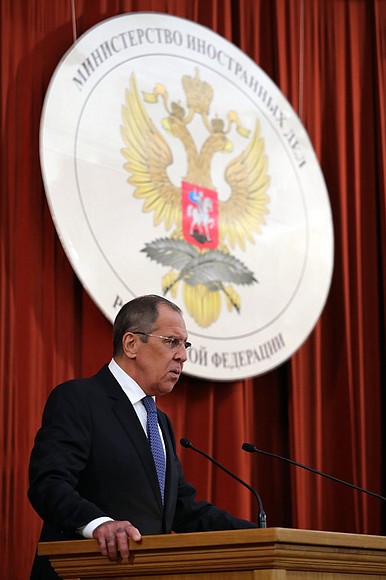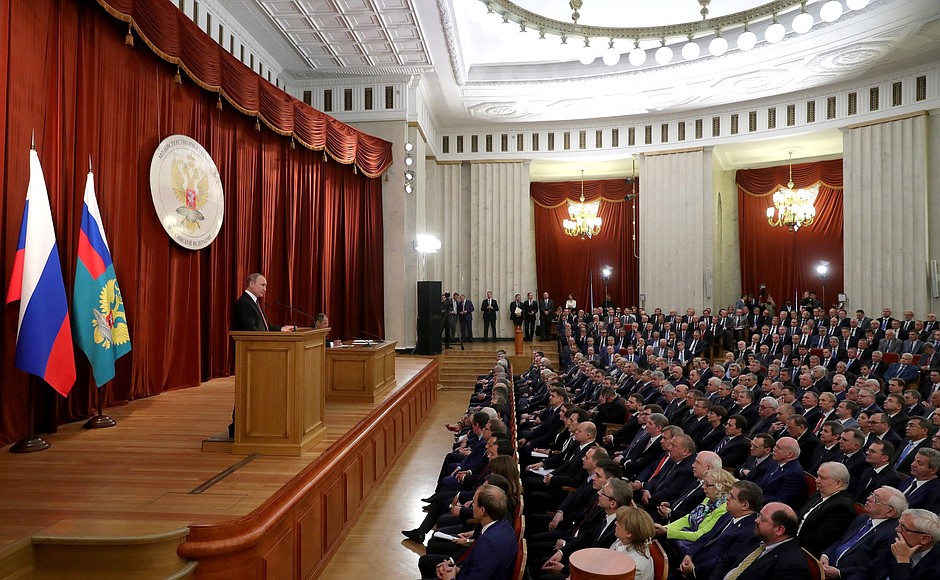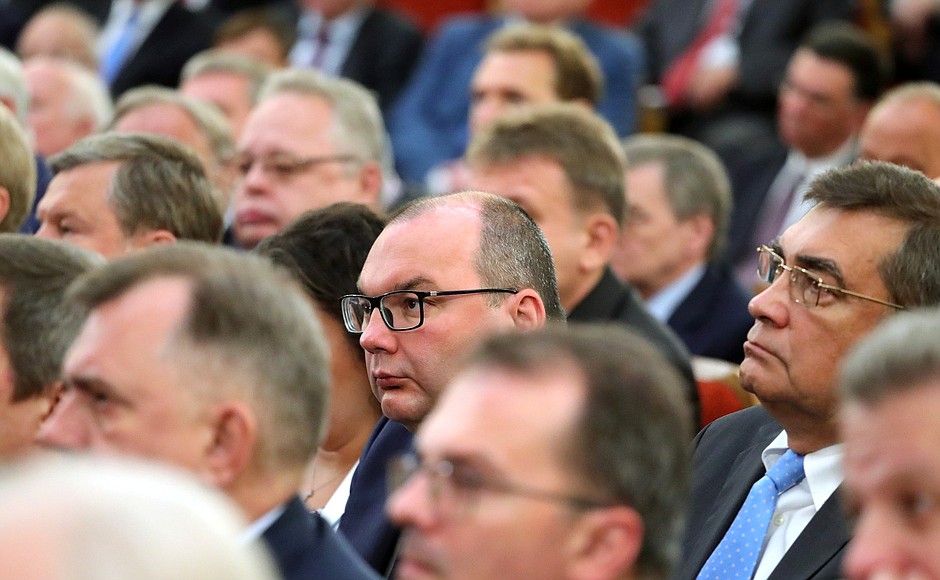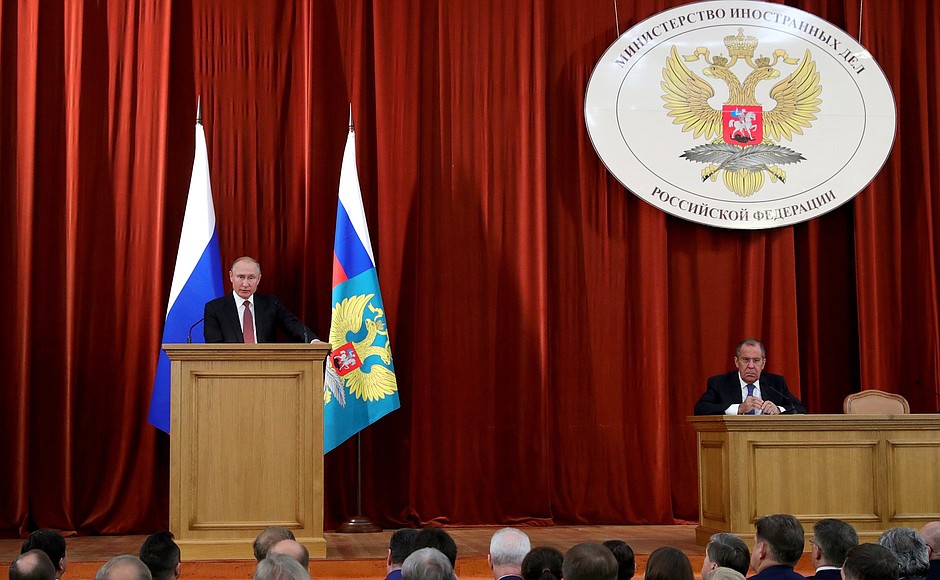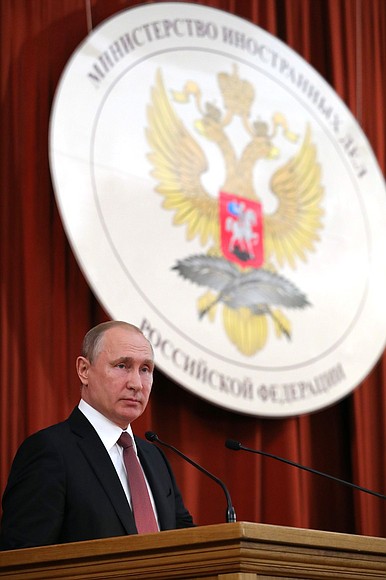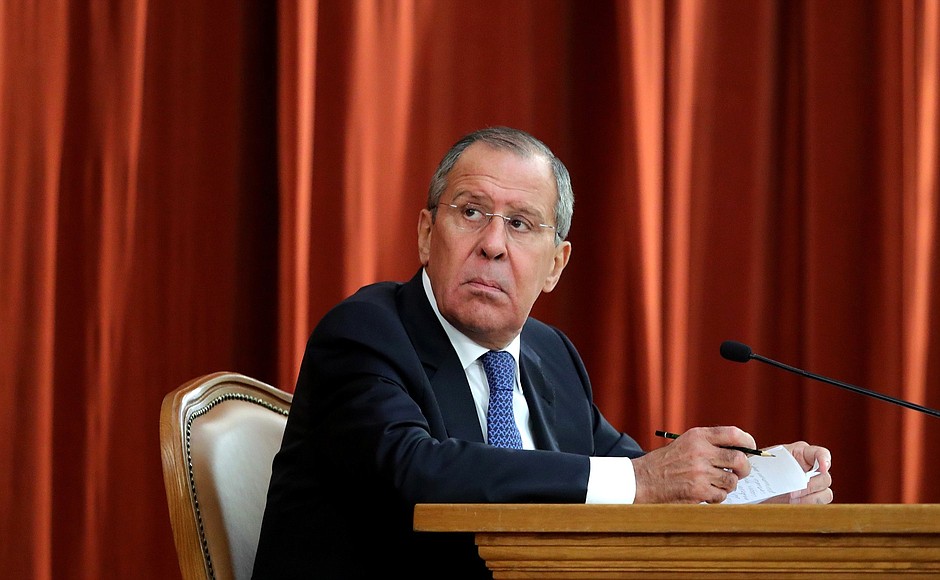Meetings of ambassadors and permanent representatives of Russia are held biannually. Invitations are issued to the leaders of the Government and both houses of the Federal Assembly, as well as heads of ministries and agencies involved in international activities plus members of the research, expert and business communities.
* * *
President of Russia Vladimir Putin: Colleagues, welcome to this traditional meeting.
First of all, I would like to express my gratitude to the leadership, staff and veterans of the diplomatic service for their efforts to protect Russia’s national interests and for their contribution to international cooperation.
The Ministry’s central office, our embassies and all other Russian missions abroad are acting professionally in a coordinated manner, fulfilling the tasks set before them. Russia is pursuing a responsible and independent foreign policy in a dynamically developing and eventful global situation.
I would like to point out that Russia’s active involvement in global affairs is driven by our priority national interest, which is to create favourable and safe conditions for the country’s breakthrough development, for attaining large-scale social and economic goals and for improving the quality of life for the people.
Our people want Russia to be a strong, independent and peaceful state. We are open to partnerships, to mutually beneficial and constructive relations with all countries and regional associations.
As a permanent member of the UN Security Council, Russia will continue to defend the fundamental principles documented in the UN Charter, which are sovereignty, equality of states, non-interference in other countries’ domestic affairs, and the just resolution of disputes. We believe that by observing international law and working together we can deal with the most complex world problems.
The world undoubtedly needs our approach to ensuring global security and stability, countering new threats and challenges.
Russia’s views on the best basis for a modern world order are supported by our allies in the CSTO, the CIS, BRICS and the SCO share. We all understand that they account for a large part of the world’s population. We have acted and will continue to act based on our principled positions when dealing with acute regional crises.
It was with Russia’s decisive role that international terrorism, ISIL and other extremist groups suffered a crushing blow in Syria. This allowed Syria to maintain its statehood and create conditions for its economic recovery and the return of refugees.
I want to once again thank our military personnel who courageously performed and continue to perform their professional duty, and, of course, diplomats who are as extensively and selflessly involved in the Syria issue.
With Russia’s active diplomatic efforts, the Astana process is moving forward. The Syrian National Dialogue Congress held in Sochi earlier this year was a significant achievement that deserves the closest attention, study and support. These efforts are laying a legitimate foundation for Syria’s revival.
Now on the agenda is the organisation of the Constitutional Committee to prepare for constitutional reform and subsequent elections, with support from the United Nations. Of course, it is extremely important that the international community intensify its efforts to provide humanitarian aid to the Syrians. We are working on this.
This is clearly important for Syria and the rest of the region, as well as for many other countries, because our active efforts can reduce the migration pressure on European countries.
Russia also proposed a solution for the Korean Peninsula involving collective efforts and dialogue. We joined forces with China to draft a plan for the gradual normalisation of the situation there.
It is good that the ideas proposed in that plan have been applied and that the sides have launched negotiations, showing respect for each other and refraining from actions that can have irreparable consequences. We hope that these positive trends, which were made possible also thanks to the contribution of US President Donald Trump, will continue to develop.
However, we have seen cases where agreements reached through concerned efforts were derailed overnight. I am referring to the unilateral US decision to withdraw from the Joint Comprehensive Plan of Action on Iran’s nuclear programme.
This document is of crucial significance for global non-proliferation. Our task is to preserve this vital arrangement and to prevent the growing tension in the Middle East from getting out of control.
There is a serious risk of aggravation of the situation in south-eastern Ukraine. The reasons are the same as always: non-compliance of the Ukrainian authorities with their own commitments and refusal to settle the conflict peacefully.
Time and again, we see open disregard for the agreements, as well as an unwillingness to talk to their own people and a reliance on military scenarios. We believe that the Minsk Package of Measures provides fundamental grounds for a political settlement of this crisis.
Colleagues, our foreign policy efforts are not aimed at achieving some kind of speculative greatness or creating problems for others. Let me reiterate that what matters most is ensuring the right conditions for the sustainable development of our country.
In the years to come, Russia must not only firmly establish itself among the world’s top five economies, but also substantially improve the key standards related to the quality of life of its citizens. To achieve these strategic objectives we must make full use of our foreign policy opportunities.
It is important that we focus our efforts on achieving specific, pragmatic results, tap new markets, expand exports and gain access to advanced technology and investment, while overcoming the obstacles and limitations Russian companies face in foreign markets.
In today’s world, the principles of competition and openness in global trade are increasingly replaced by protectionism, while economic gain and expediency are swapped for partisan agendas and political pressure. Economic ties and entrepreneurial freedom are being politicised.
Against this backdrop, Russia’s foreign policy must run counter to this trend by being more economically driven and rational. Creating a space of good neighbourly relations, wellbeing, security and stability along the entire perimeter of our state border has special importance.
The Eurasian Economic Union is a key integration project for Russia. It is gratifying that our partners are guided by the same priorities as we are within the EAEU, and we implement them together quite effectively. The essence of these approaches is to use the opportunities arising from the integration processes to stimulate economic growth in all member countries so that citizens and businesses benefit from this cooperation.
We also believe in the importance of stepping up EAEU contacts with other countries. Its free trade area with Vietnam has been launched, and talks are underway with Israel, Serbia and Singapore. Consultations with Egypt and India are to begin soon. A temporary agreement paving the way to the creation of a free trade area with Iran has been signed. All in all, there are about 50 proposals aimed at establishing partnerships with the Eurasian Economic Union.
Good prospects are opening up due to joint efforts with China resulting from the Agreement on Trade and Economic Cooperation signed in May between Beijing and the Eurasian Economic Union.
The Eurasian Economic Union and the Belt and Road Initiative are efficiently complementing each other. Harmonisation of these projects can lay the foundation for establishing a Greater Eurasian Partnership – an economic cooperation space that is as free as possible from all barriers.
We should apply the same logic to developing relations with the European Union, which remains one of our major trade partners despite current difficulties. We have many overlapping economic interests with the EU. Our common transport and energy infrastructure has been developing for decades.
I would like to emphasise that all the business projects that we are implementing with Europe, including, for instance, Nord Stream 2, are solely commercial and economically viable; they are not politically charged and have no hidden agenda.
The key to providing security and safety in Europe is in expanding cooperation and restoring trust, and not in deploying new NATO bases and military infrastructure near Russia’s borders, which is what is taking place now.
We will respond appropriately to such aggressive steps, which pose a direct threat to Russia. Our colleagues, who are trying to aggravate the situation, seeking to include, among others, Ukraine and Georgia in the orbit of the alliance, should think about the possible consequences of such an irresponsible policy.
We need a new, positive agenda aimed at collaboration and attempts to find common ground. Of course, I discussed this during my meeting with the President of the United States, Mr Trump.
With our views being different on many matters, we agreed that Russia-US relations are deeply unsatisfactory and in many ways even worse than during the Cold War.
Of course, it would be naive to believe that the problems that piled up over years would be resolved in a matter of several hours. No one was counting on this. However, I believe that we have embarked on a path to positive changes.
Importantly, a full-fledged summit with an opportunity to talk directly has finally taken place. It was overall successful and led to productive agreements.
We will have to wait and see, of course, what turn the events will take, all the more so as certain forces in America are trying to downplay and disavow the results of the Helsinki summit.
To digress from the main subject, I would like to say a few words on a personal note, so to speak.
We see that there are forces in the United States that are willing to sacrifice Russia-US relations to promote their ambitions amid the domestic political strife in America. They are ready to sacrifice the interests of their businesses, which are losing multimillion-dollar contracts and the Russian market in general, as well as jobs in the United States, even though not many, but still there are jobs in place as part of cooperation with Russia. We are talking about tens of thousands, potentially hundreds of thousands, of jobs.
They are ready to sacrifice the interests of their allies in Europe and the Middle East, in particular, those of the State of Israel. Among other things, we discussed security at the Golan Heights during the operation in Syria. Apparently, no one is interested in it. They are ready to sacrifice even their own security.
I would like to say that the New START Treaty will expire in 2021. Generally speaking, we could have lived without it even several years ago, but we took the correct step when we signed it. Unless we start working right now to coordinate its extension, it will cease to exist in a year and a half. We will simply not have this treaty.
When I spoke about these forces, you know, this does not fit our political philosophy, because we have always been taught that officials working in the interests of the state, of society must think above all about and give priority to these fundamental interests. Unfortunately, there are forces in the United States that put their narrow group and party interests before national ones.
Our famous satirical writers once wrote about such people, “Miserable, wretched people!” But this is not quite so, at least not when it comes to this case. These are not miserable or wretched people. No, they are powerful and strong people who can shove – sorry for the mauvais ton – unbelievable and illogical stories in the face of millions of their citizens. Yes, they can really do this.
I am not saying this to scold or commend anyone. Absolutely not. I am saying this so that we take this into account in our practical work in the American direction. These are the facts of modern life,
Nevertheless, Russia is open to further contacts with the United States on an equal and mutually beneficial basis. This is what not only our people but the world as a whole need. As the world’s largest nuclear powers, we have special responsibility for strategic stability and security.
Colleagues, let me say a few words on a different topic. The 2018 FIFA World Cup ended just a few days ago. Not only the heads of state and government from many countries visited Russia, but also, and most importantly, hundreds of thousands of football fans from all across the world, who saw with their own eyes the real Russia: open, friendly and modern.
This is an obvious success and a breakthrough in what is known as public diplomacy. This is attributable, among other factors, to your contribution to preparing this large-scale event. I would like to thank you for your efforts.
Colleagues, it is obvious that the workload for the Foreign Ministry’s central office and all of Russia’s embassies will not subside moving forward. There is a lot of work for you ahead, and each and every one of you has immense responsibility.
Make no mistake: the country’s leadership remains committed to ensuring the material wellbeing and enhancing the professional status of diplomats, as well as improving social security for Ministry workers. A number of decisions has been taken to this effect.
At the same time, some sensitive matters, including that of pay, social guarantees for family members, retirement pensions and housing, have yet to be addressed. Of course, the Government will work on it.
I would like to ask the Government to keep these matters under control and prevent any formalistic or bureaucratic approaches. Let me emphasise that these efforts are aimed at ensuring that diplomats can exercise their professional duties in an enabling environment, which is extremely important in terms of increasing the efficiency of our foreign policy efforts in general.
<…>
